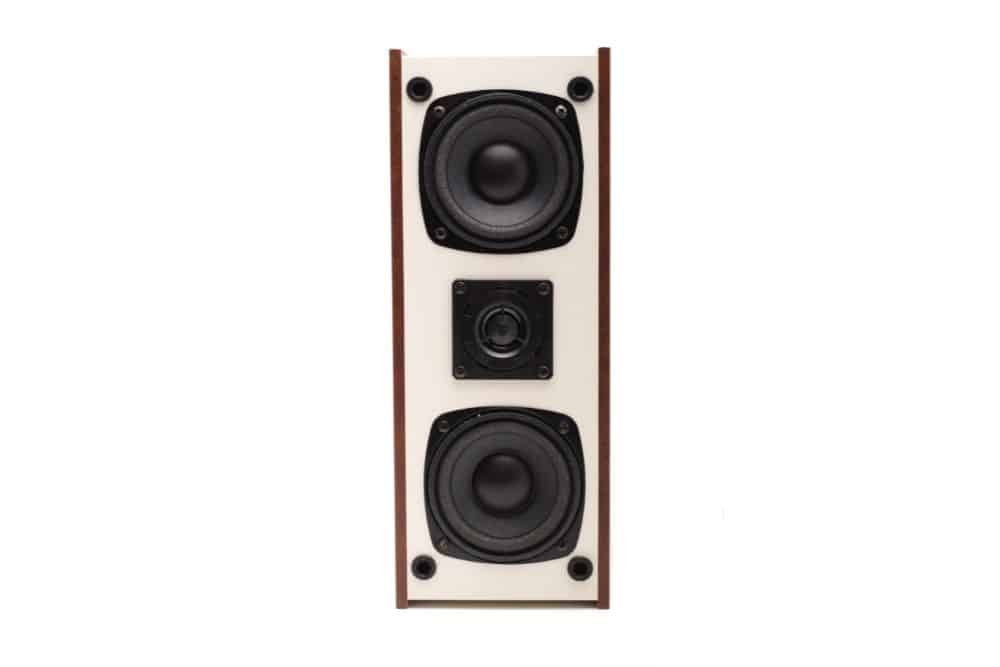You ask, can bookshelf speakers sound as good as tower speakers?
Potentially, a bookshelf speaker can sound as good when a subwoofer is used to improve the bass. A high quality bookshelf speaker won’t have the same range of sound as a tower speaker without this addition. However, this is a debated topic. There are some who think the sound quality of the bookshelf speaker can never compare to a tower speaker.
Bookshelf speakers are small and compact, which is why they’re so popular with so many people. It’s much easier to find space for a set of bookshelf speakers in an apartment or small room. However, to accommodate for this compact size, certain features need to be removed. This will affect the sound quality.

A tower speaker is larger, so has more area for woofer drives. These are used to create a deeper bass sound. The larger size also allows a greater amount of air to move through, leading to bass with a greater impact.
Due to these limitations, bookshelf speakers are often the cheaper option. If you’ve purchased, or are looking to purchase, bookshelf speakers because of size reasons, you may still have room left in the budget. In that case, there are a few things you can do to improve the sound.
Most importantly is adding a separate subwoofer. A subwoofer is designed specifically for producing low frequency audio. This is what makes up the bass sounds of music. Without bass, we don’t get the same rounded listening experience.
For a casual listener, the smaller range of a bookshelf speaker may not lead to any noticeable musical degradation. Especially if you’re used to listening without the additional subwoofer.
For an audiophile, this subwoofer makes all the difference. A subwoofer can have a frequency range of 20Hz to 200Hz, allowing every aspect of the music (or other audio) to shine.
A bookshelf speaker on its own is unlikely to ever truly match the quality of a tower speaker. Adding subwoofers is the quickest way to improve this, and create a richer listening experience.
The advantage for apartment dwellers, who are likely to need bookshelf speakers for the space, is the subwoofer can be disconnected. The bass is the sound that travels easiest, so if you live in a busy building louder music may cause issues. By buying a separate subwoofer you can improve sound when you’re alone, and be a good neighbor in the evenings.
Another way to improve the sound of a bookshelf speaker is to move the speaker away from the bookshelf. The reason for doing this is to reduce vibration.
A speaker will vibrate with the sound it produces. These vibrations can resonate along the bookshelf itself and cause an annoying undertone that disturbs the listening experience. Of course, if you’re buying smaller speakers for space-saving, this may not be an option.
Initial quality is also a factor. It would be inaccurate to claim that all tower speakers are better than all bookshelf speakers. A high-quality bookshelf speaker will undoubtedly produce a better sound than a low-quality tower speaker.
By adding a subwoofer and freestanding the speaker, a bookshelf speaker can be as good as a tower.
Are floor speakers better than bookshelf?
There is no definitive answer to whether floor speakers, otherwise known as tower speakers, are better than bookshelf speakers, but they do generally have a greater bass sound. However, there are a few other factors to consider before purchasing.
Sound quality is the main feature, and few will argue that a bookshelf speaker on its own has a greater sound quality than a floor speaker. Floor speakers have a better range of sounds, including a deeper bass. This gives the floor speaker a richer impact. The compact bookshelf speaker can’t compare to this, although they can be improved.
Adding a subwoofer to a bookshelf speaker increases the range of lower frequencies, leading to a comparably rich tone. So, while a floor speaker may initially have a better sound quality, bookshelf speakers can be improved with a subwoofer to bridge this gap.
If you enjoy blasting your music, then the floor speaker is generally the better choice. On the whole, tower speakers convert power more efficiently into volume. If you want the full concert experience, a set of floor speakers will create the same overwhelming volume better than a bookshelf speaker. This is also an advantage for movie watching in a home cinema.
The one area where bookshelf speakers can’t be beat is space. These are compact machines, and therefore don’t take up the same room as tower speakers. They’re also more portable, so can be moved from room to room with less hassle. Some would argue that as bookshelf speakers can be hidden better, they also create a more immersive experience.
For anyone living in a small apartment, bookshelf speakers have a definite advantage. They can create a solid listening experience without dominating a room, and they still reach a high volume. Unless you really hate your neighbors, you’re unlikely to want the same loud volume a tower speaker can provide.
Finally, budget has to be considered. For the most part, floor speakers cost more than bookshelf speakers. If you’re looking to save money but still want an improved listening experience, bookshelf speakers are better.
If you have a larger budget, then tower speakers will deliver a better performance. A low cost floor speaker can easily be of lower quality than a similarly priced bookshelf option.
For audiophiles, there’s no clear answer as to which speakers are better. While some will argue for a floor speaker every time, some prefer a bookshelf speaker with added subwoofer. While bookshelf speakers are more suitable for a range of homes, floor speakers have better bass and a higher volume.
If you’re looking to purchase a speaker, the best way is to give them a listen before you buy. Immerse yourself in the rich listening experience a good speaker can provide, before you make a choice.
